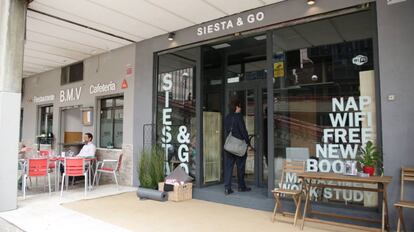Will Spaniards pay for their siestas? Spain’s first “nap bar” hopes so
New Madrid establishment inspired by similar sleep services in Japan, Belgium and Argentina
Many people associate Spain with siesta. And yet Spaniards have been slow to turn a profit from this habit. Japan, Argentina and Belgium are far ahead on this issue, explains María Estrella Jorro de Inza, owner of Siesta and Go, Spain’s very first business offering customers some down time in between activities.

Located in Madrid’s AZCA business area, which is filled with offices, Siesta and Go hopes to become a refuge for local workers seeking a quiet place to rest, read, or take a nap.
In Argentina and Belgium, these places are known as “siestodromes” and “nap bars.” But De Inza discovered the business model in Japan.
The place has 19 beds, although they have only been full once
“On a trip we took, we realized that there were many options: rest centers for women, for men, and mixed options.”
She decided to import the idea. For €20, a client gets three hours to rest in their own personal space. It is also possible to pay by the minute, and prices vary depending on what one wants: a couch (€1.5 for 30 minutes), a bunk bed (€2 for 30 minutes) or a private room (€3 for 30 minutes).
“Once a customer’s entrance is registered in our computer system, there’s a five-minute courtesy period to let them get comfortable,” explains the owner. The establishment offers slippers and shirts for those who really want to feel at home.
There are no shrill alarm clocks here. An employee will gently wake up the customer at the agreed time. The establishment also offers coffee, newspapers and an internet connection.
“Our average customer is 30 to 45 years old,” says Johan Grillo, the manager, who notes that they get as many men as women coming through the doors.
At first, says De Inza, people would look puzzled when they walked by. Inside, they would ask: “So this is for taking naps? I’ll have to come.”
There are no shrill alarm clocks here; an employee will gently wake up the customer at the agreed time
According to the owner, customers tend to return again and again. The place has 19 beds, although they have only been full once. “We’re getting there slowly,” she says.
As to whether Spaniards really do nap or not, the research is patchy. While it is true that lunch breaks in Spain still tend to be longer than elsewhere, a 2009 study carried out by a foundation attached to the San Carlos Clinical Hospital (Fundadeps) and the Spanish Bed Manufacturers Association (Asocama) found that just 16.2% of people in the country take a nap every day while 58.6% never do so.
English version by Susana Urra.
Tu suscripción se está usando en otro dispositivo
¿Quieres añadir otro usuario a tu suscripción?
Si continúas leyendo en este dispositivo, no se podrá leer en el otro.
FlechaTu suscripción se está usando en otro dispositivo y solo puedes acceder a EL PAÍS desde un dispositivo a la vez.
Si quieres compartir tu cuenta, cambia tu suscripción a la modalidad Premium, así podrás añadir otro usuario. Cada uno accederá con su propia cuenta de email, lo que os permitirá personalizar vuestra experiencia en EL PAÍS.
¿Tienes una suscripción de empresa? Accede aquí para contratar más cuentas.
En el caso de no saber quién está usando tu cuenta, te recomendamos cambiar tu contraseña aquí.
Si decides continuar compartiendo tu cuenta, este mensaje se mostrará en tu dispositivo y en el de la otra persona que está usando tu cuenta de forma indefinida, afectando a tu experiencia de lectura. Puedes consultar aquí los términos y condiciones de la suscripción digital.








































